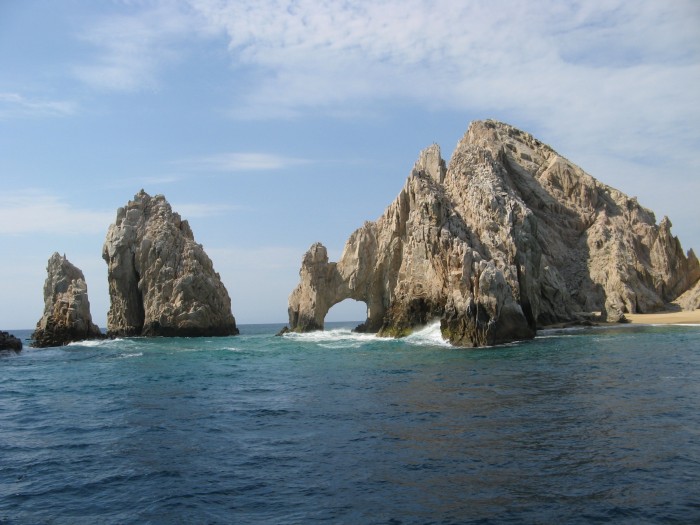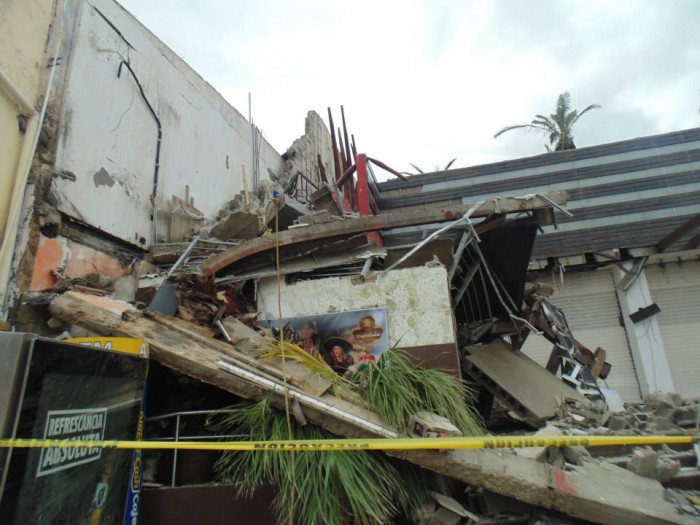Right now in one small corner of the world people I know personally are fighting for their lives.
Perhaps the only reason I know about it is because for the past eleven years my husband and I have visited Cabo San Lucas and become close friends with some of the locals. These people are some of the most incredible friends I have ever known. They’re hardworking, loyal, kind, open, loving and generous almost to a fault.
I have never once heard them complain about what they don’t have compared to what we Americans have, although the gap between us concerning material and other things, is more like a chasm.
I was perusing recent photos of the devastation due to Hurricane Odile that touched down in Cabo on September 14, 2014 (these were photos just of Cabo San Lucas, not those of lesser-known towns at the tip of the Baja nor any of the other places around the world that have been destroyed by floods, tsunamis, fires or other acts of nature).
See all those aerial photos of what—mere moments prior to the storm—were once grandiose, expensive hotels and homes? See the ones on the outermost edges; the privileged ones with balconies larger than most— unobstructed views of the ocean—perhaps with their own private infinity pools? Those that must have had luxurious linens on the exquisite oversized beds, hand-loomed rugs on the floor or tiles laid by local workers paid less than $5 a day? Those that probably had polished silver in the drawers and hand-blown crystal glassware in the cabinets, bars stocked with the finest imported wines, cheeses and chocolates? Much larger rooms, providing designer robes and slippers to vacationers who could afford all this?
But oh, those balconies, roofs and walls have been damaged just as severely as the rest, perhaps even more so since they are situated on the outer edges of the grand resorts and took a more direct hit from the hurricane. Entire patches of the roofs are missing, hundred-year-old palm trees, even automobiles were tossed around like toothpicks in the relentless winds. Mudslides and torrential rains forced the collapse some of the balconies and smashed windows, revealing now-filthy and unsalvageable ornate couches, chairs and artwork; previously regarded only by the privileged but now exposed to the prying eyes of the rest of the world.
Not to mention the poor. In Cabo there is no middle class. With a few exceptions most people who live there are either dirt poor or movie-star-rich. The shacks of the lower class—often constructed of palm-branched roofs, cardboard walls or plywood—have been flattened as if stepped on by some cruel giant; fragments of their meager lives scattered and strewn about like forgotten toys as if they never mattered.
Nature does not discriminate between rich and poor. True, the wealthy will be able to recover more quickly and completely but when I see the photos—see the privileged ones having been leveled the same as everyone else—it makes me think that even though there will always be those who have more than most, when it all comes down to it, they are no better than the rest of us.
The moment tragedy strikes—whether it be a natural disaster or the death of a loved one—we are all reduced to the same playing field; survival.
It doesn’t matter what race, religion, color or status; we all need food, water, shelter, clothing, medical attention. What does this teach us about life and our petty differences? The wars we fight over who’s right and who’s wrong? Jealousy? Contempt? Prejudice?
If you consider these things merely from a haves and have-nots standpoint—if you haven’t any cash in your pocket when disaster hits or when credit card machines are rendered inoperable, when there is no electricity or phone service, when all the stores within walking distance (because the roads are impassable) are decimated to the point where their goods are no longer viable, when there are no able-bodied workers available to pay for help even if you did have money because they are all trying to save their families as well—your money is suddenly worthless.
My friends, who were directly affected by the hurricane, report a slightly different perspective than that of the media. We are suddenly all on the same level; human beings. It’s during life and death moments such as these that humanness shows. When we have nothing more than our mental capabilities, our skills, our intelligence, our compassion and our willingness to help others, that’s when life’s true meaning reveals itself. History has proved, sometimes those with power can rob us of our freedom, material things, even our families but—although they may try—they can never take from us our spirit, skills or our hearts; unless we allow them to.
It’s not about having the house with the sunniest lot on the block, the most up-to-date car or a gazillion dollars. I’m not saying it’s wrong to want or to work towards acquiring these things but I am saying that in the end, what matters is how much you loved and were loved; all the times you quietly rolled up your sleeves and got your hands and clothes dirty helping others without expectation of recognition or reward and with whatever means you were capable at the time.
The true character of a human being lies in what a person does when no one else is looking or when times are tough for one’s self or for someone else.
My religious upbringing would say that whenever we do something kind for someone else—even if we don’t see a reward in this lifetime—we will be rewarded in heaven. But I think that heaven (and hell) is a state of being that’s accessible to us in each and every moment; that we can experience what true heaven is right here, right now, in our hearts. It is not what I would call a reward but a true lesson in what it means to be human and to experience the meaning of life here on planet Earth; to grow, to advance on a spiritual level because we are all connected and what we do for one another, we also do for ourselves. As Jesus said,
“What you do to the least of my brethren, you do also to me.”
~ Matthew 25:40
I also don’t believe in judging those who appear to have what I do not; material things, good looks, better health, status or other privileges. I do not, nor will I likely ever, know their circumstances. Maybe that person we observe who appears to be able to afford the best of everything is secretly dying of an excruciatingly painful disease or maybe they have no one who loves them and are rotting away on the inside from loneliness or feelings of inadequacy, from which all the money in the world cannot save them.
As a result of this latest storm, I’ve heard outsiders make comments like: look at all those rotten people looting stores! But I wonder: what would these critics do if they were in that situation and had no access to their money or their credit cards and were forced to watch their precious babies or elderly go without food, water, medicine or blankets?
And I hear criticism about how the rich and famous are or are not contributing to disaster relief and it makes me think: how do you know what that person is or isn’t doing behind the scenes or what their intentions are?
I will never know precisely what’s in the hearts of others and what is in their hearts is what matters most. Who am I to judge?
I’m grateful for the people and the material things in my life. I’m grateful for a mind and a heart that can reason, love and remain open to the ideas of others. I’m grateful for the opportunity to be an inhabitant of this planet, in this incarnation, at this moment with all of you; to be of service to the world using the gifts with which I’ve been blessed.
Although you may not see precisely what I am or am not doing, I’m doing my utmost to make my contribution to the lives of those with whom I am blessed to share this world—even though I wouldn’t complain if I did have a nice balcony facing the ocean, fancy linens, imported cheeses and wines stocking my refrigerator or a Mercedes in my driveway—and I’m sure we all are doing the same.
We begin with ourselves. Then we share.
~
~
Love elephant and want to go steady?
Sign up for our (curated) daily and weekly newsletters!
~
~
Editor: Ashleigh Hitchcock
Photos: used with permission by Suset Esquivel Flores













Read 0 comments and reply